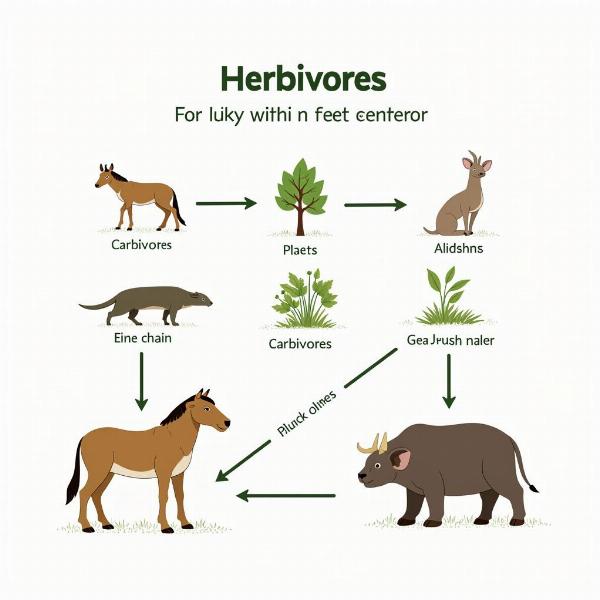Herbivores, those gentle giants and nimble grazers, play a vital role in the world’s ecosystems. But what exactly does “herbivore” mean in Hindi? This article delves into the Hindi meaning of herbivores, exploring their significance in Indian culture, religion, and daily life. We’ll also touch upon related terms and concepts, providing a comprehensive understanding of this important ecological group.
The Hindi word for herbivore is शाकाहारी (shaakahari). This term is derived from two Sanskrit words: शाक (shaak) meaning vegetable or plant, and आहारी (aahari) meaning eater or consumer. So, quite literally, shaakahari translates to “plant-eater.” Understanding this simple etymology provides a clear and concise definition of the term “herbivores” within the Hindi language context.
Understanding Shakahari: More Than Just a Diet
While shaakahari directly refers to a diet consisting of plants, it holds deeper cultural and religious significance in India. Vegetarianism is widely practiced, often rooted in principles of non-violence (ahimsa) central to Hinduism, Jainism, and Buddhism. This reverence for life extends to all creatures, making a plant-based diet a natural choice for many. Thus, the term shaakahari goes beyond just a dietary choice; it represents a way of life interwoven with deeply held beliefs and values.
Herbivores in Indian Ecosystems
India, with its diverse landscapes, is home to a rich variety of herbivores. From the majestic elephants of the Western Ghats to the nimble deer of the grasslands, these animals play crucial roles in maintaining the balance of their respective ecosystems. They contribute to seed dispersal, nutrient cycling, and vegetation management, shaping the very landscapes they inhabit.
The Role of Herbivores in Indian Agriculture
Herbivores, particularly domesticated ones like cows and buffaloes, are integral to Indian agriculture. They provide milk, a staple in the Indian diet, and are also used for plowing fields and other agricultural tasks. This interconnectedness between humans and herbivores has been a defining feature of Indian rural life for centuries.
Exploring Related Terminology
Several Hindi words are associated with herbivores, offering further insights into their characteristics and ecological roles:
-
जुगाली करने वाला (jugali karne wala): This term refers to ruminants, herbivores with specialized digestive systems that allow them to ferment plant material in a multi-compartment stomach. Examples include cows, goats, and deer. You can learn more about the specific term “jugali” on our page jugali meaning in hindi.
-
शिकार (shikaar): While meaning “hunt” or “prey,” this word highlights the relationship between herbivores and their predators. Understanding the concept of prey animals provides a more complete picture of the food chain dynamics. Explore further with our article on prey animals meaning in hindi.
-
पोषी स्तर (poshi star): This translates to “trophic level,” referring to the position an organism occupies in a food chain. Herbivores occupy the primary consumer level, feeding directly on producers (plants). For a deeper dive into this concept, visit our page on trophic meaning in hindi.
How do I say “herbivores only eat plants” in Hindi?
You can say “शाकाहारी केवल पौधे खाते हैं (Shakahari kewal paudhe khate hain)”. This directly translates to “Herbivores only eat plants.”
What is the opposite of herbivore in Hindi?
The opposite of herbivore is मांसाहारी (mansahari), meaning carnivore. Another term is सर्वाहारी (sarwahari) which means omnivore.
 Herbivore Food Chain
Herbivore Food Chain
Conclusion
The Hindi meaning of herbivores, shaakahari, encompasses not just a dietary category but a complex interplay of cultural, religious, and ecological significance within India. Understanding the various terms associated with herbivores and their roles within the ecosystem provides a deeper appreciation for these essential components of the natural world. For further exploration, check out our detailed article on the meaning of herbivores in hindi.
FAQ
- What does “shaak” mean? “Shaak” means vegetable or plant.
- Is being shaakahari common in India? Yes, vegetarianism is widely practiced in India.
- Are all vegetarians in India shaakahari for religious reasons? While many adopt a vegetarian diet due to religious beliefs, others choose it for health or ethical reasons.
- Do herbivores play a role in Indian mythology? Yes, various herbivores feature prominently in Indian mythology, often symbolizing gentleness, strength, and prosperity.
- What are some examples of herbivores found in India? Elephants, deer, cows, goats, and rabbits are some common examples.
- What is the importance of understanding “herbivore” in Hindi? Understanding this term provides insights into Indian culture, language, and ecological awareness.
- Where can I learn more about the Hindi language? Meaning-Hindi.in offers a wealth of resources on Hindi language and culture.
Meaning-Hindi.in is your one-stop solution for all your Hindi translation needs. We offer professional translation services for a wide range of documents, including business and commercial materials, legal and certified documents, technical manuals, website localization, and educational materials. We also provide specialized translation services in various fields. Our team of expert translators ensures accurate and culturally sensitive translations. Need a quick turnaround? We offer expedited translation services as well. Contact us today for all your Hindi translation requirements at [email protected] or call us at +91 11-4502-7584. Meaning-Hindi.in is your trusted partner for bridging the language gap.